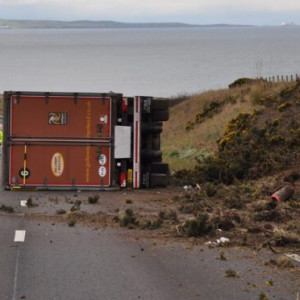A77 is one landslip away from halting UK freight industry

(C) Supplied by Jim Ryder Crashes have become a common site on the A77.
Crashes have become a common site on the A77.
It is the road campaigners describe as southern Scotland's answer to the Rest and Be Thankful. The A77 runs down the Ayrshire coast and is one of the UK's most important routes. It acts as a main artery carrying goods and passengers between the mainland and Northern Ireland via the ferry service at Cairnryan.
The town's ports handle around 1.75 million passengers a year, including 500,00 cars and more than 400,000 freight vehicles - five times more than CalMac manages across all of its routes. But despite the key role of the A77 and neighbouring A75, local activists and politicians warn years of delayed improvements and government inaction has left it just one landslip away from bringing millions of pounds of freight to a grinding halt. Scottish ministers have faced criticism for failing to complete a number of other major road infrastructure projects, including dualling the A9 and A96.
Outrage over those routes saw SNP stalwart Fergus Ewing announce last week that he will not stand again for the party but may run as an independent to pressure the government to act.
 Fergus Ewing.
Fergus Ewing.
In the meantime, campaigners say the south west has become the forgotten corner of Scotland. They want to see major improvements to increase the reliability of the A77, which is the slowest A road in the country and one of the most unpredictable. The Scottish Chambers of Commerce has warned the A75 and A77 are suffering from "chronic under-investment which makes them dangerous, hampers economic progress and slows efforts to improve our environment".
Nearly nine years of wasted time
Research by the A77 Action Group shows that since November 2014, there have been more than 3,190 days - the equivalent of 8.7 years - where the route between Cairnryan and Girvan has been reduced to a traffic light-controlled single lane.
On average, there is an accident on either the A77 or A75 every three days, with a total of 28 people losing their lives on the roads over the past five years alone. Campaigners and local politicians believe delays are a major cause of the problem, with frustrated motorists taking risks that are costing lives. One retired police officer told The Sunday Post he has recorded some HGVs travelling in excess of 80mph on the route in an attempt to catch ferries or make up time lost to roadworks.
Donald McHarrie, from the A77 Action Group, said a succession of SNP transport ministers have "forgotten us or given us the cold shoulder".
 Pictured left to right, campaigners Willie Scobie, Donald McHarrie and John Campbell.
Pictured left to right, campaigners Willie Scobie, Donald McHarrie and John Campbell.
McHarrie said: "When you step off a ferry in Larne, you're met by dual carriageway down to Belfast. "If you get off the ferry at Belfast, you go out the port gates, down onto a slip road and you've got a multi-lane motorway heading south. "We're the poor relation.
I've often said we're the forgotten, ignored, neglected and deprived corner of Scotland." Local MP John Cooper raised the issue during Business Questions at Westminster on Thursday. He told The Sunday Post: "The significance of the A75 and A77 really can't be overstated.
They really are critical to the whole connectivity of the union. "They are key arteries between Belfast and the rest of the UK, as well as being the key link from the central belt of Scotland to Northern Ireland. "They are hugely important roads and it is just ridiculous they are treated with such disdain."
Politicians argue over who is responsible
The road is now at the centre of a row over devolution, with Cooper using his question to request a debate on how Scottish ministers engage with MPs.
It comes after Scottish Transport Secretary Fiona Hyslop refused to meet with him to discuss the A77 because of "extensive engagement" already being done with stakeholders.
 (C) FRASER BREMNERFiona Hyslop
(C) FRASER BREMNERFiona Hyslop
In a previous letter, seen by The Sunday Post, the SNP minister claimed it would "not be appropriate" to meet with Cooper or Labour MP Elaine Stewart because responsibility for the roads networks lies at Holyrood. While transport is a devolved issue, delays on the route have major consequences both in the local area and across the country. MPs frequently meet with MSPs and government ministers to discuss issues of shared interest.
In response to Cooper's question, Leader of the House Lucy Powell said she would contact Hyslop and ask her to meet with the MP.
 (C) Supplied by Jim RyderAnother crash on the A77.
(C) Supplied by Jim RyderAnother crash on the A77.
Speaking after the exchange, Cooper said: "No one wants to take responsibility for it. "Devolution was not intended to be a shield but that's exactly how Fiona Hyslop is using it." Hyslop has joined First Minister John Swinney in meeting with campaigners to discuss the A75 and A77 in recent months.
We asked why she is refusing to meet with local MPs and how she will respond to the request from the Leader of the House. The Scottish Government did not answer either of those questions. In a statement, it said it recognises the strategic importance of the A77 to Scotland's economy and remains committed to improving it.
A spokesman added: "We have given a firm commitment to invest in the safety, resilience and reliability of the A77, as well as the A75."

Enjoy the convenience of having The Sunday Post delivered as a digital ePaper straight to your smartphone, tablet or computer.
Subscribe for only GBP5.49 a month and enjoy all the benefits of the printed paper as a digital replica.
Subscribe[1]